
An audit carried out by the Ministry of Interior & Police reveals that the Dominican government regularized the status as legal residents of 252,407 that did not comply with the required documentation. Only 7,834 of those regularized presented the documentation, as reported in Listin Diario.
The audit carried out at the start of the Abinader administration established that 97% of the beneficiaries of the Plan for Regularization of Foreigners (PNRE) developed in 2013, by mandate of Constitutional Court ruling TC-0168-13. 56% percent did not provide any of the required documents.
The main problem is that the governments of Haiti have not issued the documentation over the years. Most people in Haiti do not have legal documentation.
Listin Diario explains that the audit was carried out in 2022 through the Vice-Ministry of Interior and Police for Migratory Affairs and Naturalization, headed by attorney Juan Manuel Rosario.
Rosario said there was much internal and external pressure to legalize the Haitians. “They were given the migratory status without presenting any document, and all this was to bend to the pressures of foreign organizations, which is the most regrettable thing, because if the Dominican Republic decides that, well, it doesn’t matter, we decided it, and there is no problem,” said Juan Manuel Rosario.
He pointed out that in the PNRE the past Medina administration spent US$55 million, an amount he considered high.
Likewise, he said that the naturalization process of 800 people who were granted Dominican nationality through two decrees, was done irregularly because those favored did not present the documents required by Law 169-14.
Law 169-14 was enacted on 23 May 2014, and it established a special regime for persons born in the national territory irregularly registered in the Dominican civil registry and on naturalization.
Under the protection of that law, in the Medina administration, 750 persons of Haitian descent were granted Dominican nationality, and then, in the current administration, another 50.
Deputy Minister Juan Manuel Rosario explained that based on this law, a little more than 6,000 persons were registered. Rosario explained that the law did not order to give people Dominican citizenship, rather it called to register the people, so that they could then obtain a residency from the Migration Agency, and then two years later they could obtain naturalization, via Law 1683.
Article 8 of Law 169-14 established that “the children of foreigners born in the Dominican Republic, regularized per the provisions of the National Plan for Regularization of Foreigners (PNRE) in irregular migratory situation, may opt for ordinary naturalization established in the law governing the matter once two years have elapsed since obtaining one of the migratory categories established in the General Migration Law No. 285-04, provided that they prove through certification the inexistence of a criminal record.
Rosario explained: “They do not want to go for naturalization, they want to be naturalized in a special way, without any requirement. That is what the international organizations want. And we are not going to allow that, because it would be violating the institutions of the Dominican Republic.”
He said the law establishes the foreigners need to present themselves to the Ministry of Interior & Police and that if after six months they do not present themselves, the decree that benefited them with the regularization is considered revoked.
He also explained that Law 169-14 has long since expired. He specified that it started in July 2014 and ended in January 2015. After that, there have been no more requests for regularization.
He pointed out that the 800 beneficiaries of this legislation already have their residency. “What we are waiting for is for them to comply with the requirements for naturalization, to go and submit and they will be treated as all foreigners are treated in the Dominican Republic,” he told Listin Diario.
Nevertheless, he said that from July 2015 to July 2016, 90,000 foreigners who registered after the deadline were regularized, through stickers placed in their passports. That is, they were given similar treatment as a visa, according to data from the Vice Ministry of Interior and Police.
The Dominican government at the time granted the regularization of status to those who could prove time spent in the country, local ties and labor and socioeconomic relations.
Read more in Spanish:
Listin Diario
14 September 2023

